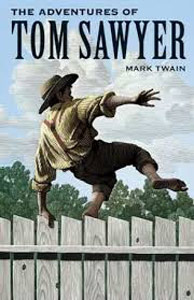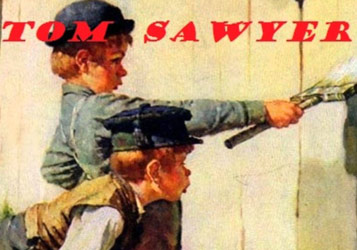Tom's fearful secret and conscience disturbed his
sleep for as much as a week. At breakfast one morning Sid said,
"Tom, you move around and talk in your sleep so much that you keep me awake half
the time."
Tom looked down and said nothing.
"It's a bad sign," said Aunt Polly, seriously. "What have you got on your mind,
Tom?"
"Nothing. Nothing that I know of." But the boy's hand shook and he spilled his
coffee.
"And you talk in your sleep a lot," Sid said. "Last night you said, 'It's blood,
it's blood, that's what it is!' You said that over and over again. And you said,
'Don't torment me. I'll tell!' Tell what? What is it you'll tell?"
Everything was swimming before Tom. There is no knowing what might have happened,
now, but luckily the concern passed out of Aunt Polly's face and she came to
Tom's relief without knowing it. She said,
"It's that dreadful murder. I dream about it almost every night myself.
Sometimes I dream it's me who did it."
Mary said she had been affected the same way. Sid seemed satisfied. Tom got out
of there as quickly as he could, and after that he complained of a toothache for
a week, and tied up his mouth every night.
He didn’t know that Sid was watching him every night, and frequently took the
bandage off and listened for a long time, and afterward put the bandage back to
its place again.
Tom's distress disappeared gradually and the toothache became annoying and was
forgotten about.
If Sid really did manage to understand anything from what Tom was saying in his
sleep, he kept it to himself.
It seemed to Tom that his schoolmates would never stop asking about dead cats,
and therefore keeping his trouble always on mind.
Sid noticed that Tom never was coroner at one of these inquiries, though it had
been his habit to take the lead in all new enterprises.
He noticed, too, that Tom never acted as a witness, and that was strange.
Sid did also not overlook the fact that Tom didn’t even like these inquests, and
always avoided them when he could.
Sid was amazed, but he said nothing.
However, even inquests went out of fashion eventually, and stopped torturing
Tom's conscience.
Every day or two, during this time of sadness, Tom took every chance to go to
the jail and push small comforts through the small jail-window to the "murderer".
The jail was a little brick building that stood at the end of the village, and
no guards were there because it was seldom occupied.
Passing these offerings to the prisoner greatly helped to ease Tom's conscience.
The villagers had a strong desire to punish Injun Joe for body-snatching, but so
formidable was his character that nobody could be found who was willing to take
the lead in the matter, so it was dropped.
He had been careful to begin both of his inquest-statements with the fight,
without confessing the grave-robbery that preceded it. So, it was decided not to
hear the case in the courts at present.
... to be continued!
* The text has been adapted from the Adventures
of Tom Sawyer
by Mark Twain
 Download the
original book for free
Download the
original book for free
 *Consulta
un PDF con la información y resumen de 100 libros en inglés
*Consulta
un PDF con la información y resumen de 100 libros en inglés
que puedes descargar en 1 único archivo.

 Tom Sawyer – Part Thirty-eight
Tom Sawyer – Part Thirty-eight




